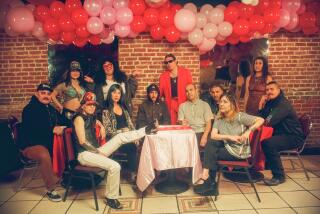A life more ordinary, all the better, for these anthropologists
- Share via
RICHARDTON, N.D. — For this, they pay him?
Tom Fricke, long blond hair clipped back in a ponytail, is hanging out.
He’s hanging out with farmers, with a high school principal, with a manufacturing executive. He orders the 13-ounce prime rib when they do. He matches them, scoop for scoop, at the ice cream counter. He zips about town in his mini-sport-utility vehicle, gabbing with the locals every chance he gets.
And yes--although even his parents don’t believe it--all this hanging out is work.
Fricke, a professor at the University of Michigan, is on the vanguard of a new trend in academia: an intense, anthropological study of us.
That is, of average, hard-working, middle-class Americans. Folks who wake up, grumbling, to an alarm clock each morning, who juggle job and family, who try to give their kids the best. “We’re interested in the extraordinariness of everyday life,” said Charles Darrah, an anthropologist at San Jose State University.
Shadowing Subjects in Search of Insights
Darrah focuses on Silicon Valley professionals. Fricke, on rural North Dakotans. Other anthropologists are examining suburbanites in Philadelphia, African Americans in New York and stressed-out families in Atlanta. Using what they call an “ethnographic” approach--which basically means shadowing their subjects at home, at work and at play--they watch our humdrum lives up close in an effort to figure out how we’re all coping.
“It’s not exactly that we’re voyeurs,” Fricke starts to say. Then he thinks about it and backtracks. “If we are voyeurs,” he amends, sounding pretty sure the description fits, “at least we have degrees.”
He chuckles. “We’re credentialed voyeurs.”
Fricke’s work is funded by a $2.8-million grant from the Alfred P. Sloan Foundation in New York, which has set aside $20 million over four years for just such prosaic studies. The foundation has supported research centers at UC Berkeley, the University of Chicago and Cornell University, along with Fricke’s Center for the Ethnography of Everyday Life.
“We are in the midst of profound changes in society, but people are not aware of them because we’re so caught up in living them,” said Kathleen Christensen, a Sloan Foundation program director. “Just as a fish doesn’t understand the water, I don’t know that we fully understand what day-to-day life is like.”
By tailing actual people through typical days, anthropologists--who have traditionally focused on exotic foreign cultures--hope to help us understand ourselves.
“When I shadow a 3-year-old around, on the surface, that wouldn’t seem to be an encapsulation of our culture,” said Jan English-Leuck, who works in the Silicon Valley. “But when that 3-year-old turns to his little sister and says: ‘Don’t bother me, I’m working,’ well, that’s something you wouldn’t hear in a small village in Suriname. That [illustrates] part of American culture: our view of the primacy of work.”
Hanging out in this snug little town of 626, set amid the broad vistas and lumpy hay bales of western North Dakota, Fricke seeks another perspective on everyday life: the view from a rural land that’s swiftly emptying out as young people leave for better jobs or smoother lives.
So far, Fricke has discovered that this exodus of the young has forced the parents they leave behind to adjust their definition of family. North Dakotans have typically viewed family as an overflowing clan of extended relatives who all got together every Sunday for supper. Now, those left in Richardton are forced to adjust to their kids’ priorities, which involve moving out of state for work or for school. It’s been a painful wrench into the realities of modern, middle-class life, where jobs often take top billing over family.
“There’s tension and friction there,” Fricke says.
Fricke hopes, after another year of study here, to turn his insights into a book on the peculiar stresses of life in a fading rural community. The Silicon Valley anthropologists, meanwhile, are working on a text of their own, about a very different culture--one where parents network, cell phones at the ready, even as they pace the sidelines of their children’s soccer games.
Disparate themes, to be sure, but with a common goal: exposing the tensions and trade-offs in everyday life that everyone seems aware of, if only in a vague, unsettling sense.
“The feeling that there is a problem is pervasive. It’s absolutely pervasive,” said Bradd Shores, an anthropologist studying family rituals in Atlanta.
“Maybe the more we know ourselves, the more capable we’ll be of improving,” suggested Kenneth Kreitinger, a Richardton executive who has been cooperating with Fricke.
But anthropologists readily admit their methods have some drawbacks.
For one, it’s hard to get representative samples.
Anthropologists can’t just pick random people and follow them around all day. They need their subjects’ cooperation. And there always will be plenty of folks like the waitress in the coffee shop here who snapped: “I’m not worthy of study. I got too much work to do.” Or the elderly lady nibbling her fries who huffed: “It’s a bunch of baloney. What good’s going to come of it? I don’t need anybody seeing how I live.”
Plus, by their very presence, researchers may affect the choices their subjects make--or at least make them feel self-conscious. “Everyone wants to be the fly on the wall, but you can’t be,” said John L. Jackson Jr., an anthropologist doing doctoral work in Harlem.
Working Hard to Get Divergent Views
Because of these limitations, “it’s very difficult to make policy on the basis of anthropological studies,” said sociologist Barbara Schneider of the University of Chicago. Ethnographies offer rich detail and texture but require randomized, controlled surveys to back up their anecdotal points, Schneider said.
Aware of the problem, anthropologists say they work hard to get divergent views. But they naturally spend the most time with the friendliest people.
Fricke, for instance, has been hanging out with farmers Callen and Julie Hoff and their teenage son, Casey. The Hoffs invited Fricke to dinner the first time they met. Now, they keep urging him to stay in their spare bedroom. They cheerfully acknowledge they’re not quite sure just what he’s studying. (“The other night,” Julie Hoff recounted, “I looked at Cal and asked, ‘What does an anthropologist do, anyway?’ So we got out the World Book and looked it up.”)
Still, they willingly talk into his tape recorder.
“We kind of like to talk about ourselves,” Julie Hoff said.
“If someone’s willing to listen, we’ll ramble on and on,” her husband added. “It’s human nature.”
More to Read
Sign up for Essential California
The most important California stories and recommendations in your inbox every morning.
You may occasionally receive promotional content from the Los Angeles Times.













